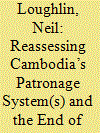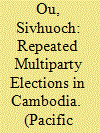| Srl | Item |
| 1 |
ID:
173687


|
|
|
|
|
| Summary/Abstract |
The dominant literature on Cambodian politics over the past two decades suggested that a mixture of elite and mass clientelism had enabled the hegemonic Cambodian People’s Party (CPP) to rule via competitive but authoritarian elections, while lessening its previous reliance on repression and violence. Such explanations did not predict the upswing in contestation in the country in 2013 and thereafter. Neither do they account for the crackdown that followed. Following literature that draws attention to the tensions in building and maintaining political coalitions under authoritarianism, and demonstrating the difficulties in maintaining competitive authoritarianism over time, this article draws attention to structural, institutional, and distributional impediments to the CPP leadership in building and maintaining effective reciprocal relations with electoral clients while simultaneously balancing the interests of the military and other elites at the core of the regime. To make its argument, the article compares weaknesses in the CPP’s electoral clientelism with the effectiveness of patronage within the security forces, seen through the lens of Cambodia’s experience of land dispossession. It shows that an extractive and exclusive political economy privileged the interests of regime insiders over potential mass electoral clients precisely during the same period the CPP was supposed to be securing its hold on power via mass electoral clientelism. This further explains why the regime fell back on repression over reform in response to the upswing in contestation manifest from 2013, and why, despite the failings of its mass patronage project, repression has nevertheless been successful as a strategy for regime survival during a period of heightened popular contestation.
|
|
|
|
|
|
|
|
|
|
|
|
|
|
|
|
| 2 |
ID:
173690


|
|
|
|
|
| Summary/Abstract |
The United Nations (UN) introduced multiparty elections to Cambodia in 1993 in the hope of bringing about democracy in that country. Ironically, the two-and-a-half decades of uninterrupted elections have led to an ever-more authoritarian government under Prime Minister Hun Sen and the Cambodian People’s Party (CPP). Authoritarianism under the single-dominant party system began in 1997, but has intensified since 2017 with the ban on the leading opposition party. While concurring that repetitive elections have consolidated authoritarianism, this paper argues that elections are not merely tools that authoritarian leaders deploy to hold on to power. Elections are arguably mechanisms that have compelled the CPP to offer several extraordinary economic policy concessions since 2013; this is the first argument of the paper. The developments have created a win-win scenario for the rulers and the ruled—the authoritarian leaders prolong their rule, and the masses have more disposable income, among various benefits. The second argument is that such policy concessions are made only when the ruling party senses critical challenges from the opposition and voters. This paper contributes to the literature arguing that multiparty elections in electoral authoritarian regimes extract economic policy concessions.
|
|
|
|
|
|
|
|
|
|
|
|
|
|
|
|
| 3 |
ID:
153512


|
|
|
|
|
| Summary/Abstract |
This paper will assess Cambodia’s current and future strategic and security
situation, arguing that current and future Cambodian national security will be
determined by the three key strategic security issues of domestic, geographic,
human and economic security. These three key security factors have significantly
underpinned Cambodia’s strategic challenges. The first strategic challenge is related
to the current domestic political deadlock between the two major political parties,
the ruling Cambodian People’s Party (CPP), led by Prime Minister Hun and the
opposition Cambodia National Rescue Party (CNRP), led by Sam Rainsy. The
current political contestation has significant challenges for Cambodian national
development as well as foreign policy. The second major strategic challenge
for Cambodia relates to economic security, and the requirement to balance the
strategic competition between China and the United States to gain influence within
Cambodia. This external power competition has a significant impact on Cambodia’s
political and economic circumstances as Cambodia remains heavily dependent
on foreign aid for political and economic development as can be seen today. The
key challenge is that while China and the United States are the largest providers,
they are competing for their own interests and influence in Cambodia, and the
wider Southeast Asian region. The third challenge facing Cambodia is centered
around managing its relationship with China and ASEAN claimants in the context
of territorial disputes over the South China Sea. This environment presents one of
the most challenging difficulties for the kingdom’s contemporary foreign policy.
These challenges have greatly impacted and shaped Cambodia’s reform agenda,
defense posture, political system and international engagements. The paper will also
consider how Cambodia’s effort and commitment towards reform and its integration
with the international community will not be achieved without overcoming these
three challenges.
|
|
|
|
|
|
|
|
|
|
|
|
|
|
|
|